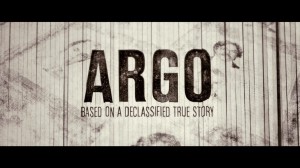
If you are a speechwriter, I recommend you see the movie “Argo”.
“Argo” is a simple story written by Ben Affleck about Tony Mendez. Mendez is a CIA operative who rescues six Americans during the Iran hostage crisis in 1981.
In 1979, Iran’s Shah is given asylum in the U.S. after his cancer diagnosis. Known as an oppressor of the people, his constituents want him returned to stand trial for his crimes. Thus, the people’s only recourse is to invade the American embassy and hold Americans hostage.
However, after an inventory is taken of the embassy’s personnel, Iran’s army realizes six are missing and hunt them down. Meanwhile, the escapees have sought refuge in the Canadian embassy where they remain for more than a year.
Mendez enters Iran under the cover of Kevin Harkins, film producer. He gives the six cover identities as a Canadian film crew scouting locations for “Argo”, a science fiction movie.
While under pressure to complete the mission, Harkins must take the crew to a local bazaar to establish credibility with the government. Yet, two of the six, Joe and Kathy Stafford, refuse to go.
Here’s where the speechwriter’s lesson comes in. Joe tells Harkins, “I’m sorry, Mr. Harkins. We just don’t trust you.”
Now Harkins can continue pleading, use force or ditch them. Unexpectedly, he does none. He says, “My name is Tony Mendez. I’m from New York. My father worked construction. My mother was a schoolteacher. I have a wife and a 10-year-old son. You play along with me today, I promise I’ll get you out.”
This is an important moment for speechwriters. It highlights the key to captivating an audience by writing a genuine narrative in the speaker’s authentic voice. This act allows the audience to learn something about the speaker and themselves. This holds their attention, educates, entertains and creates action.
Telling the speaker’s story and including personal anecdotes can shift a speech’s paradigm and unveil whom the speaker is as a mother, father, friend, colleague and community leader. It shows the speaker keeps a messy desk, holds a pen awkwardly, buys the wrong ingredients and even burns the chicken – it makes the speaker human. Without this story, a speech can run thin and be a bore.
Bone up on your interviewing skills
The key to story telling in speechwriting is savvy interviewing skills. My method is the same way you peel back an onion – one question at a time.
- Why are you passionate about this issue?
- When did you discover this and what happened?
- What was your interpretation of that moment?
- How did you feel about it?
- Why do you feel it stays with you?
After the interview, you must decide where in the draft does the tale belong? I say the beginning or the end.
Personally, I prefer at the outset and, if you’ve got the skills, use humor. Good lines capture the audience and help them relax. It says, “She (or he) will be entertaining and won’t waste my time regurgitating PowerPoint slides.”
The other option is at the end.
No matter the placement though, if the speechwriter does his job and the speakers do theirs, human stories can touch the heart, give hope to those who need it and make us act. Including anecdotes in speeches invite us in, move, educate, and entertain us.
 Anthony Fireman is a new member of the PRSA Boston Chapter. He is a freelance speechwriter focusing on keynote addresses, graduation speeches, and association events. Fireman wrote for The MetroWest Daily News writing feature business stories as a daily correspondent. Email him at
Anthony Fireman is a new member of the PRSA Boston Chapter. He is a freelance speechwriter focusing on keynote addresses, graduation speeches, and association events. Fireman wrote for The MetroWest Daily News writing feature business stories as a daily correspondent. Email him at